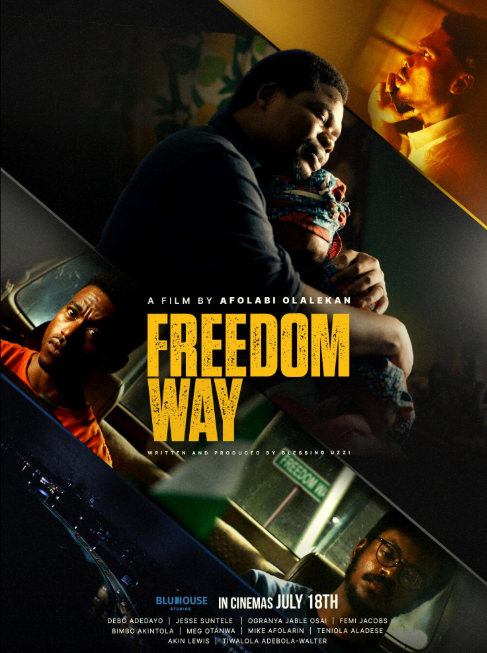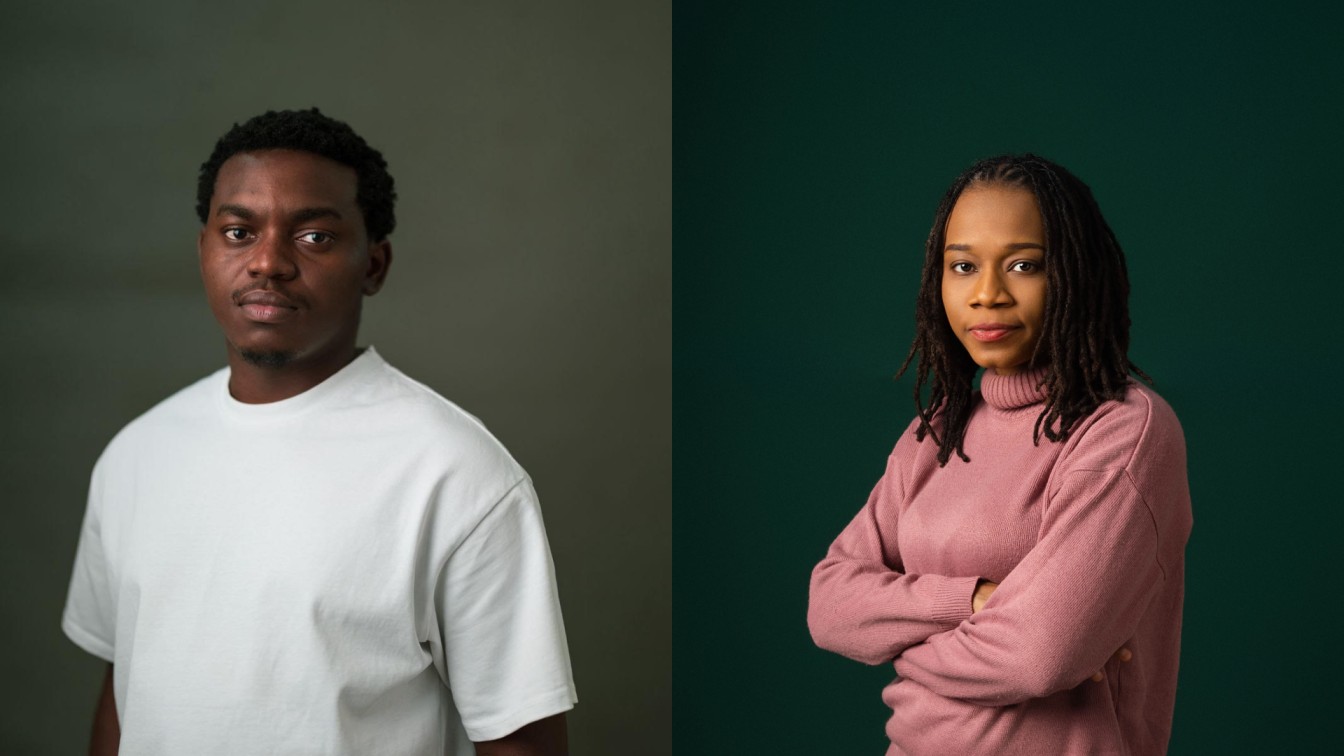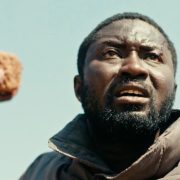“I’m really hoping that it’s a film that people will watch and come out with hope enough and faith enough to say, ‘How can we now effect change? How can we start creating conversations?’” — Afolabi Olalekan.
By Vivian Nneka Nwajiaku
In Nigeria, Africa’s most populous country, dysfunction has become so familiar that it is now normalised. But in Freedom Way (2024), first-time feature director, Afolabi Olalekan, and writer/producer, Blessing Uzzi, confront that dysfunction with an unflinching gaze, weaving a difficult story around nine individuals in Lagos whose lives intertwine after a sudden change in government policy throws the city into chaos.
Since premiering at the Toronto International Film Festival (TIFF), the film has had an impressive run, earning the Special Jury Prize at the 2024 Africa International Film Festival (AFRIFF), opening the 32nd New York African Film Festival, and winning both Best Movie and Best Writing (Movie) at the 2025 Africa Magic Viewers’ Choice Awards. For a film that is both engaging and urgent, it’s not difficult to see why it’s been successful. As we observed in our recent review, it’s a film that puts the country’s systemic dysfunction on loud display.
“I think we’re in such an interesting and fragile place”, says Olalekan. “As individuals, there’s really nothing much we can particularly do to fix it, except in our little way, by making films like this and creating conversations like this”. Uzzi does not disagree. In fact, she is even more optimistic. “I believe in Nigeria”, she says. “I think change is possible. If anything, Freedom Way has re-affirmed my belief that it is possible”.
With Freedom Way now showing in cinemas, Afolabi Olalekan and Blessing Uzzi sit with Afrocritik to discuss how Freedom Way came to be, their influences, and the impact they hope that their film has on audiences.
*This Interview has been edited for length and clarity.
How does it feel for your film to have this level of acceptance both home and abroad?
Afolabi Olalekan: It’s the first time we’re releasing a film, and also the debut feature film that I’m directing. So, I’d say it’s an overall good feeling, to be on the journey with the film, from making the film up until going to festivals, to the AMVCA.
Blessing Uzzi: I was actually already satisfied by the nomination, personally. But then, winning (AMVCA) was shocking. And it was also encouraging. It was in categories with very popular films that the audience had seen, so that was a risky thing on their end. So, I’m happy and shocked, and, yeah, I’m grateful.
What does Freedom Way mean to you, and how did that title come to define the story?
Blessing Uzzi: We didn’t start off with Freedom Way as a title. Finding a title was probably the hardest work ever, because of how connected the characters were. I remember naming it first ‘No Way Out’, and I hated the title so much. And one day, I was at a restaurant with Lekan, and I can’t remember exactly how that conversation came up, and I just said, “What of ‘Freedom Way’?” Both of us just laughed it off. And then, one day again, we were driving on Freedom Way, and I was like “Are you sure this ‘Freedom Way’ title [won’t] work?”
Because we saw police van, and I started remembering that actually, police are always on this Freedom Way. On Freedom Way, police harassment is crazy. Freedom Way itself is a crazy place, and you meet all sorts of people there. Everything happens on that street. And then, it just made sense for the film, because it felt like everyone was fighting for their freedom one way or the other.
Afolabi Olalekan: In the simplest form, I think Freedom Way is, in a sense, a request for change. Because we’re all asking for something, which is for a better country.

You must have had several experiences that could have inspired you to make a film like Freedom Way, but what was the exact trigger that made it urgent?
Blessing Uzzi: A random day, I was with a friend, and police stopped us and asked him [for] the receipt of his laptop. I found that both funny and ridiculous. I was like, “Who moves around with receipt?” That stayed with me for a long time. And then, a friend started a campaign with Bella Naija called “Treat now, ask questions later”, and I was reading stories of people losing their loved ones to a lack of police report at the hospital, another ridiculous thing that I didn’t know was happening in Nigeria.
I read a lot of those articles that it prompted me to write a short film called ‘The Report’. I now changed the name to ‘All Night Long’ because everything happened at night in the story. I had it for the longest time, and I didn’t know what to do with it. But then, when I decided to actually make it, the whole situation with Gokada had happened where [the government] banned bikes.
I was like, I see a common theme here. It was police people seizing the bikes. Police are the ones enforcing this government policy. Police are also the ones that are enforcing this hospital policy. So, it just felt like I could build a thread around the whole thing.
And then, [from] an article, I found out that you can join the police force without necessarily being a [police officer]. That now felt like the thing that brought everything together. And I started writing.
You know when a writer says, “As I was writing, it was flowing”? Freedom Way was that for me. It was fun to write it. I knew what I was writing was relatable and was true. The writing felt honest, the writing process. So, put that together, and here we are.

Afolabi Olalekan: From the point of view of triggers that made me come on the project, I don’t think there was anything in particular. I think it was just because I was very much part of the process. And I remember we sat at the restaurant looking at it and just talking about it, and the conversation just went into the option of me directing it.
But then, I think it’s also because I’ve had prior experience with [the] police in several regards. Before then and after then. A lot of cumulative stuff together was happening at the same time during that period, and it just made sense to just do it. It was a no-brainer at that point.
Did any other African film influence Freedom Way, and why was the film’s loud, aggressive approach your preference?
Blessing Uzzi: Writing wise, Crash (2024) was more of my reference. There are many ways you could have approached Freedom Way. It could have been quiet, but I don’t know that for Abiola, the bike man, that was going to be honest.
The world Freedom Way is set in is a bit loud. Banning okada, protests, there is nothing quiet about those things. Especially in Nigeria where an ordinary, quiet protest can turn violent. So, I needed it to be extremely true to that.
I also needed it to appeal to a wider audience, which was why Freedom Way getting into festivals was also shocking for me. I just wanted it to be something that is relatable to Nigerians and Nigerian in every way and form in the storytelling. But thankfully, the film had more to offer than we even imagined.
Afolabi Olalekan: As regards having references, I had references from other films, in terms of framing of characters. Films that are not even in the same world, like Queen of Katwe (2016), and as weird as it is, Joker (2019). Just films that build characters in a very interesting manner. How I kind of approached it was especially focusing on each of the characters’ story and less on trying to create beautiful shots.
Shooting outdoors in Lagos comes with unique problems, like harassment from area boys. How did you manage it?
Blessing Uzzi: It was incredibly difficult to do, because we were shooting during rainy season. But because we’ve done a couple of commercials, even Lekan has shot music videos there, we’ve built relationships with the people that manage Lagos Island. So, we were good. In fact, I always say those people became my chief security officers. We spent money, obviously, but they were quite kind.
On production end, it was difficult. I didn’t know when I was writing, but writing night scenes means you’re shooting between 8pm till 4am. So, scheduling night sequences was quite something. That part, I think writing next time, I’ll think about it very well.
Afolabi Olalekan: Creating music videos and content for artistes, I could record and work every single day for a full week and not feel like I’ve done any work at all because we have another week that’s coming up and I need to go again. So, working every single day, every single night, it was very hectic, but it was something I was already used to.
I think the difficult part was probably moving with a crew that, in a sense, I haven’t worked with. I’d worked with the DPs, but you have a lot of film crew, people that I’ve not really worked with. So, it was building a language with everybody and understanding exactly how it functions in this world.
And also, I’m working with actors. I feel like the film industry works in a different way than the music industry works. You have to adapt to a new pattern and figure out a way to make them understand the language you’re speaking. But I’m glad we were able to get to a place where everybody felt comfortable enough to deliver. Lagos Island was the most interesting place to shoot because, like Blessing said, we barely had any sort of issues at all in Lagos Island.

Blessing Uzzi: Lagos Island has a very strong aesthetic. Visually, it’s strong. Also, the story world is mostly what you encounter on the Island. And Lagos Island also has a lonely feel to it in the night.
In the afternoon, it’s so rowdy; in the evening, it’s so quiet. So, it was also one of the places we knew we could control a bit more. We were closing off the road at certain points, and they would allow us because there were other ways to move around. So, it just felt like the perfect place.
One thing that stood out was the inclusion of a foreigner’s POV, with Jesse Suntele’s South African character, Themba. How did you approach that?
Afolabi Olalekan: Jesse is a natural. It was a very good experience working with him because he was very attentive. It was about just finding out what the character needed to help the other character. We have Ogranya’s character, Tayo, who takes his time to process stuff.
Then, you have a polar opposite who just jumps at things. Having that contrast between the both of them helps their relationship, because as human beings, when you have a partner, it’s most likely that the person will be way different from you.
So, approaching it from that sense, and also bringing Jesse’s actual character into it, because he’s a very playful person. That’s pretty much how I approached it from the directing point of view.

What was your thinking behind his inclusion?
Blessing Uzzi: From the first draft, he wasn’t an afterthought. In fact, I was like, if he’s not South African, just someone that isn’t a Nigerian. And the reason was simple. I have a lot of tech friends who are founders of different companies in Nigeria, and most times, their co-founder isn’t Nigerian. I realised it’s because you need someone to bring in their own perspective, bring resources from their own country.
It felt more true to not make the tech founders both Nigerians. For diversity, for different perspectives. So that when foreigners are watching this film, they are feeling what the character in the film is feeling, and when Nigerians are seeing it, they’re also seeing that some of these things we’ve gotten used to [aren’t] normal.
What do you hope people come away with when they watch Freedom Way?
Afolabi Olalekan: I don’t think Freedom Way is one of those films that have a moral lesson. It’s a film that kind of opens your eyes to see. Not like we don’t know what’s going on, but what the film does is that it reminds you and it makes you actually now see what’s happening around you fully.
I’m really hoping that it’s a film that people will watch and come out with hope enough and faith enough to say, ‘How can we now effect change? How can we start creating conversations?’
Blessing Uzzi: I think it should make people reflect, actually, and understand that our actions have consequences. None of us is immune from the action of the other person. You’re reading about what’s happening somewhere, and you’re like, “Oh, it’s not my business.” It may be your business tomorrow. It may be your business in the most random [way]. A little more consciousness with the decisions we make everyday, and understanding that it has an impact.
* Freedom Way opened in Nigerian cinemas on 18th June, 2025.
Vivian Nneka Nwajiaku is a writer, film critic, TV lover, and occasional storyteller writing from Lagos. She has a master’s degree in law but spends most of her time watching, reading about and discussing films and TV shows. She’s particularly concerned about what art has to say about society’s relationship with women. Connect with her on X @Nneka_Viv



